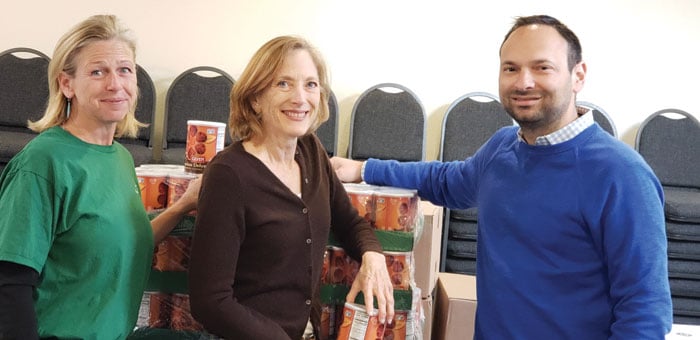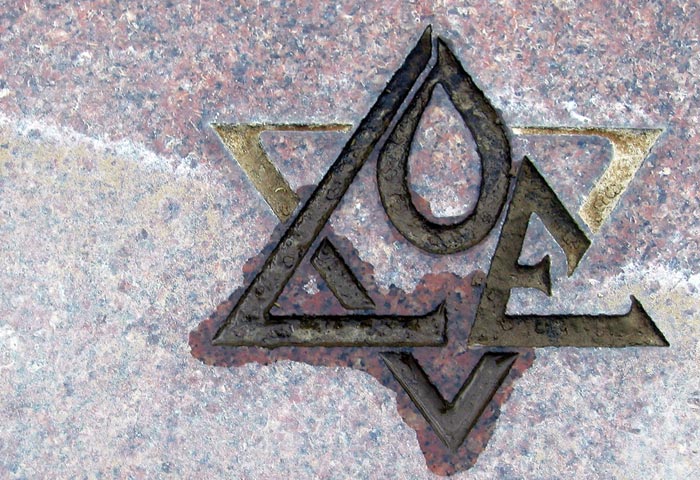 Stephanie Ginzburg, left, Renalee Pflug and Rabbi Lebovitz. Photo by Ari L. Noonan
Stephanie Ginzburg, left, Renalee Pflug and Rabbi Lebovitz. Photo by Ari L. Noonan When Nazis were hunting down and slaughtering Jews across Europe in the 1940s, the most optimistic Jews could not have imagined scenes that played out last week across Los Angeles.
Forty Adat Shalom synagogue members fanned out to the homes of 200 of the neediest survivors of the Shoah bearing kosher for Passover food.
Adat Shalom raised nearly $10,000 from its community, purchased the food from Western Kosher and then packaged it. Two food bundles were handed to each of the frail elderly survivors. Their impoverished status requires them to rely on Jewish Family Service and its social venue for survivors, Café Europa, for basic needs.
“The thought that they could not get kosher for Pesach food was the impetus.” – Renalee Pflug
“We have done amazing programs with Café Europa for years,” said Renalee Pflug, Adat Shalom’s executive director. “At the start of the pandemic two years ago, we realized that while all of us were struggling, the Holocaust survivors of Café Europa really were having a difficult time, especially when it came to Passover. The thought that they could not get kosher for Pesach food was the impetus.”
Rabbi Nolan Lebovitz and board member Stephanie Ginzburg, now chair of the shul’s Café Europa Passover Initiative, started the mitzvah project. As the pandemic struck, “the rabbi and Stephanie said ‘We need to do something,’” said Pflug. “We called in support and donations from Western Kosher and volunteers to provide food.”
As Lebovitz closes out his seventh and final year at the Conservative shul (to take the senior position at Valley Beth Shalom), the 200 families who comprise the community are familiar with perhaps his most defining declaration: “It always has been a passion of mine to help prevailors,” the rabbi’s preferred term for survivors of the Shoah.
Lebovitz explained why he coined this term. “I call survivors prevailors because I don’t like identifying my four grandparents solely by their survival,” he said. “I have never met a person who just survived the Shoah. They prevailed in the sense that they created new lives, they created new families, they created businesses, they created a whole new world. In that sense, they prevailed. I acknowledge they prevailed.”
The seed for Adat Shalom’s Passover gifts was sown unobtrusively, the rabbi recalled.
“Two very special congregants of mine, the Ginzburgs, Evelyn in particular, heard me give a sermon on the Shoah,” he said. “She asked if I had any interest in Café Europa. I began volunteering as rabbi for the holidays and different events throughout the year.”
Then, the rabbi wanted to know what else he could do.
“Every interaction I had drove me to do more,” he said. “What we are doing now was the result of a need during the pandemic. Everybody was reluctant to go into supermarkets, especially this demographic, and they needed Passover groceries.”
Lebovitz said his motivation is direct: “It is the responsibility of the entire Jewish community to make sure that the prevailors of the Shoah have what they need for Passover.”
Stephanie, a daughter-in-law of the Ginzburgs the rabbi mentioned, was pleasantly surprised that the number of recipients almost doubled last year’s total.
“We had 118 prevailors a year ago,” she said, “and now we are up to 200 by gathering in people who were on the outskirts.”
Stephanie does not know how many survivors live in the Los Angeles area. “I hate to comment, because I recognize that every day there are fewer,” she said. We are in a golden time to be able to serve this particular group. We will not be able to do this for more than a decade. We are on the threshold of being able to offer as much as we can.”
How did Adat Shalom become the first synagogue to create this gift for survivors?
“I have to say, there are beautiful people in the community who have touch points,” Stephanie said. “This is a specially guarded community – it takes a special kind of connection to be able to have the trust and confidence that the people involved in the project have the right intentions and that they are able to assist in the most momentous way right now at this moment.”
The Ginzburg connection with Café Europa, which meets every Tuesday in Mid City, dates back decades. “My mother-in-law already was working with them 20 years ago,” said Stephanie. “It’s a nice way for them to keep the human connection going. That is most important.”
On the morning the food packages were being bundled, Stephanie was the first to arrive. “Here’s what Adat Shalom has provided, and this was the beauty we saw last year,” she said. “Coming together to do all of this was really the first time since the pandemic began that we were able to come back together, physically, as a community with what we were able to put out. This built so much energy and ruach.”
Even Stephanie was surprised. “It really did snowball for us into a much bigger thing than we had anticipated,” she said. The biggest surprise for the army of volunteers was still to come. “The connection we were able to have when we approached the doors of these prevailors was best of all,” Stephanie said. “Each of us was able to speak to them and have full conversations. All of us delivered, [even] the rabbi and his family.
Each prevailor received two containers: Three boxes of matzah, matzah ball mix, cake mix, grape juice, seltzer water, gefilte fish, macaroons, tea, turkey cold cuts, a carton of eggs and a bouquet of flowers.
According to Stephanie, it was crucial to realize some recipients do not have anyone to say hello to every day. “This was a way for us to say ‘We are still here for you. We are not forgetting you. You are part of our community.’”























 More news and opinions than at a Shabbat dinner, right in your inbox.
More news and opinions than at a Shabbat dinner, right in your inbox.